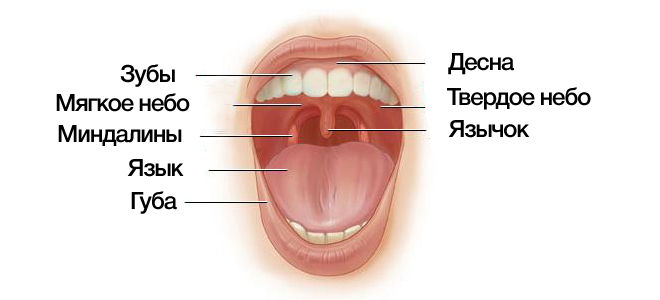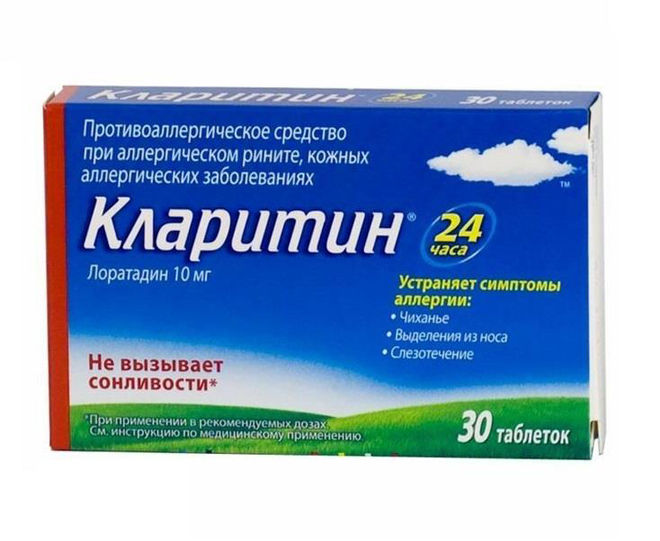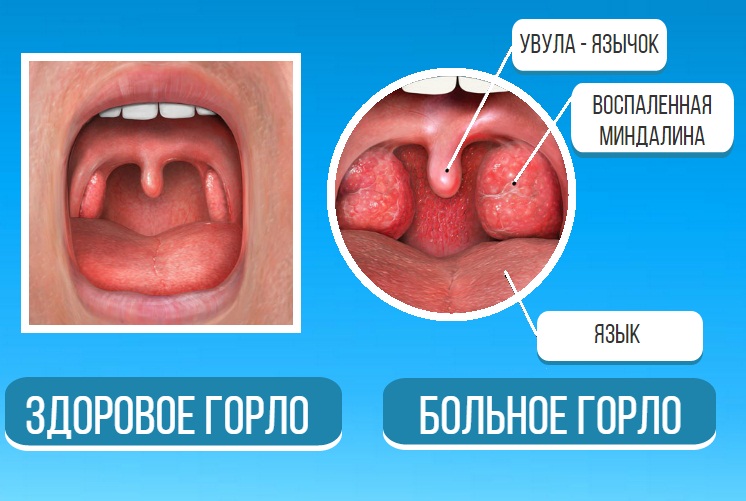The uvula swells up. What is the tongue in the throat and what to do when it is inflamed
The small uvula performs many important functions. Usually they pay no attention to him. But the inflammation of the uvula in the throat cannot go unnoticed, as it is accompanied by rather unpleasant symptoms. And if the ways of dealing with colds are known to almost everyone, then similar situation able to enter into a state of confusion.
Functions of the small tongue
Despite the fact that small tongue It has a small size, it performs many very important functions:
- the separation of food and air flows, as well as their redirection;
- protection against ingress of large foreign objects in the pharynx;
- challenge gag reflex;
- separation of the throat and protection against the spread of infection in both its halves;
- warming cold air with mouth breathing;
- participation in the formation of the correct sounds in the construction of speech.
If the tongue is inflamed and swollen, it will not be able to fully perform its main tasks. Therefore, it is necessary as soon as possible to find the causes of the problem and proceed with adequate treatment.

Causes of the disease
The disease, during which the tongue swells, is called uvulit. The causes of its occurrence can be quite diverse.
First, the problem can be provoked by other diseases of the nasopharynx. Uvulitis does not appear every time. This usually occurs as a result of pronounced inflammatory processes and the spread of edema to the soft tissues of the palate. Contribute to the process can greatly reduced immunity of the patient.
The uvula may swell up with:
- angina;
- tonsillitis;
- pharyngitis;
- rhinitis;
- diphtheria;
- the presence of specific infections: HIV, tuberculosis, actinomycosis, syphilis;
- inflammatory processes gums and oral mucosa: stomatitis, periodontitis;
- purulent infections oral cavity or pharynx.
Another reason for the development of uvulita - allergies. In this case, the problem comes suddenly. It does not stop until the end of exposure of the allergen to the body. This item should not be overlooked by those patients who had previously encountered angioedema, urticaria, hay fever, bronchial asthma.
The third group of causes for the development of uvulita is mechanical. These include:
- burns of the mucous membrane;
- prolonged exposure to too low temperatures;
- irritation with alcoholic beverages. tobacco and other substances;
- damage due strong cough or night snoring;
- mechanical damage by hard objects or food.
Fourth group possible reasons development uvulita least common. This is the appearance of tumor formations. Therefore, during the diagnosis and appointment proper treatment this option should not be overlooked.
Symptoms of the disease
The symptoms of uvulita are difficult to confuse with something else. They are quite specific and appear completely suddenly.
The main symptoms of uvulita are as follows:
- feeling of presence in the throat of a foreign object;
- problems with swallowing, and sometimes even breathing;
- depending on the strength of the edema, difficulties may arise with the pronunciation of individual sounds;
- excessive salivation.
With all this, you can see with the naked eye that the tongue is very red (sometimes even with a slight blue), swollen and longer.

Diagnosis of the disease
After finding that the tongue is swollen, you should immediately seek help from a doctor. This also applies to those cases where the other symptoms described above are absent. The disease can develop very rapidly and after a short period of time, the tongue can increase even more and make the breathing process more difficult. To conduct self-treatment is prohibited!
What doctor to contact if a small tongue is swollen? There are several options. It can be an ENT, a dentist or even an oncologist. The best option is to go to an appointment with a therapist who will either prescribe a treatment or write out a referral to the right specialist.
Diagnosis uvulita does not take much time. A routine examination is sufficient to detect the presence of a disease. But to assess its severity, the patient may need to undergo some additional examinations:
- blood test;
- seeding on microflora to determine sensitivity to antibiotics;
- allergic diagnosis, immunogram;
- back rhinoscopy, pharyngoscopy;
- tomography, radiography.
Treatment
Treatment of ugulitis should be carried out with the utmost care. This will help to quickly get rid of the disease and prevent the occurrence of complications. Treatment may vary depending on the causes of the disease. Therefore, only the doctor can select the correct medication.
If the disease is allergic in nature, it will need to be treated with antihistamines (Loratadin, Tavegil, Erius, Suprastin, Cimetidine, Claritin, Cetrin, Diazolin) and diuretic drugs. They will help relieve swelling and remove excess fluid from the body. In this case, diuretics should be taken in combination with drugs that will not allow the excretion of calcium from the body, will restore its reserves (Furasemid, Triphaz).

If the tongue is swollen, treatment should be directed to prevent the development of asphyxia. In this case, the patient is prescribed decongestants (Trifas, Furosemide) and glucocorticosteroids (Diprofos, Medrol, Sondex).
In such a situation, the problem may be accompanied by:
- rashes, redness on the skin;
- itching;
- lacrimation;
- runny nose, sneezing, choking cough.
If taking antihistamines did not bring any result, then the disease is likely to be infectious. In this case, the treatment involves taking antibacterial (Amoxiclav) and antiviral (Arbidol) agents. Perhaps their combination in one drug - it sprays Ingalipt, Gorlospas. Broadband antibiotics will help treat the swelling tongue. They stop the spread of the infection and get rid of it.
The disease in this case can be combined with:
- fever;
- sore throat;
- cough;
- plaque on the mucous membranes of the throat, tongue;
- headaches;
- body aches;
- nasal congestion;
- sore throat.

There is no specific treatment for the uvula swollen as a result of the injury. In this situation, simply gargle with chamomile solution. In the absence of a result or deterioration of the condition, the tongue will need to be treated with antibacterial and anti-inflammatory agents.
In each of the above cases, it is possible to use immunomodulatory agents. They will help increase the body's defenses, quickly overcome the infection.
It is possible to conduct physiotherapy procedures:
- phototherapy;
- electrophoresis;
- aromatherapy;
- acupuncture;
- UHF-therapy;
- magnetic therapy;
- speleotherapy;
- herbal medicine;
- mechanotherapy;
- inhalation;
- electrotherapy;
- diet therapy.
In cases where the formation of pus has begun, the treatment of an illness with drugs does not make sense. In such a situation, there is a need for surgical intervention. The same applies to cases in which the tongue increased in size due to the formation of polyps.
If the problem arose after a huge amount of alcohol consumed, simply drink as much liquid as possible during the day.
The tongue in the throat performs the following functions:
- separates air flows, redirecting them further;
- protects the throat and airways from falling into them of external objects; the role of the tongue in this case is insignificant, but it is an excellent insurer, because if something extra falls into the pharynx area, then a small tongue can cause a gag reflex;
- the same gag reflex will be very useful in case of poisoning;
- separates the flow of food;
- warms the air inhaled through the mouth, which is inevitable if the nose is stuffed up and does not breathe;
- takes part in the formation of speech;
- it divides the throat into two halves, due to which, in most cases, only one gland becomes inflamed (the tongue prevents the spread of infection to the second).
The tongue in the throat performs many important functions, and therefore, if it is inflamed, you should immediately contact the doctor who will prescribe the correct course of treatment.
Reed edema can be caused by a number of reasons, the most common of which are:
- throat infection;
- sinusitis;
- runny nose;
- tonsillitis;
- angina;
- trauma of the tongue or tongue (leading to inflammatory processes);
- caries;
- mucosal burn chemicals;
- abuse of strong alcohol, it can burn the mucous;
- swelling in the nasopharynx;
- allergic reaction;
- taking certain medications;
- heredity.
Of course, this is by no means all of the reasons for which the tongue edema occurs, these are only the most common ones. The main thing is to understand the consequences of this. And therefore, if your body has increased in size, swollen or just causes discomfort, you should immediately contact a doctor. Considering the symptoms of the disease and establishing its causes, the physician will be able to prescribe the correct treatment.

Symptoms of the disease
Most patients report that the symptoms of the disease appear very suddenly. They are quite specific, therefore, it is not so difficult to diagnose independently that the tongue is swollen.
As a rule, the patient has a feeling that there is a lump in the throat. Sometimes it seems that there is stuck foreign object. This feeling haunts the patient for a long time, so it’s not so easy to ignore him.
There may also be problems with breathing. This is especially acute when the tongue is swollen very much. This condition of its blocking the air free movement in the respiratory tract, thereby complicating breathing. In addition, an increase in the tongue in volumes makes it difficult to swallow, sometimes the patient, in addition to discomfort, can feel pain.
There may be problems with speech, in the formation of which the tongue takes part. At the same time, the more inflamed and swollen tongue, the more distorted it may be (or some of its sounds).
Also a symptom of the disease are sudden urge to vomit, gag reflex. Large amounts of saliva can be excreted.

It is important to understand that once the symptoms appear very suddenly, which means that quickly, suddenly, first aid must be given immediately. Treatment itself and prognoses will largely depend on this. In addition, if the tongue is very swollen and greatly increased in size, it can close the airways, thereby preventing oxygen from entering the lungs.
Diagnostics
So, at the first signs or symptoms of swelling of the uvula in the throat, you should immediately consult a doctor. Indeed, with every minute, if the patient is slow and delays in going to a medical facility, the inflammation and swelling increase, which, in turn, can even lead to death due to the likelihood of choking.
Why does a throat need a tongue? Maybe nature made a mistake and supplied the body with an unnecessary element that sometimes inflames, which leads to pain and discomfort in the throat?
To properly understand the essence of the problem, you need to understand the anatomy of the tongue and find out what functions are assigned to it. The oral cavity is divided into two components - a hard and soft palate.
The hard palate in the anatomical plan is represented by bone formation, covered with a dense mucous membrane and performing protective functions. Accordingly, the soft palate is a soft formation that performs the function of moving food through the oropharynx.
Outwardly, it resembles a constriction, hanging from the edge of a hard palate and separating the oropharynx from the nasopharynx. The tongue is an extreme process of the soft palate and hangs loose in the mouth.
Since there is a rather dense knot in the process blood vessels, tongue color is bright red. And it is for this reason that this small organ often becomes inflamed.
To understand the causes of inflammation of the uvula, it is necessary to know what function the palatine process performs. Just because nothing is created in the human body, each organ is responsible for the task entrusted to it.
The uvula performs several functions at once:
- Separation of air flow and its further redirection.
- Prevention of penetration into the respiratory tract and throat of foreign objects.
- Separation of food flow.
- Challenge the vomiting reflex, which is required, for example, in case of poisoning.
- Prevent the spread of infection.
- Warming the air entering through the mouth with nasal congestion.
- Participation in the formation of voice and speech.
So many different functions are performed by a small tongue. Therefore, if he is inflamed, his treatment should begin immediately.
Disease of the uvula
The disease of the palatal process is called uvulitom. Typically, inflammation occurs suddenly. A person can fall asleep completely healthy, and in the morning feel severe pain in his throat.
In addition to pain, discomfort appears, a sensation of a lump that cannot be swallowed. Nausea may be present. If at this moment to look into the mouth, you can see that the throat is red, uvula swelling and increased in size.
In this situation, your feelings should be compared with the following symptoms:
- Feeling of presence in the throat foreign body or lump.
- Emetic urges.
- Pain and difficulty swallowing.
- Difficulty breathing.
- Speech problems.
- Abundant salivation.
If a patient has at least three of these points, he should immediately see a doctor. Otherwise, the palatal process may swell so much that it will block the airway and cause asphyxiation.
Such causes can lead to the death of a patient or oxygen starvation of the brain, with tissue ischemia.
How to diagnose inflammation
At the first signs of inflammation of the uvula, the patient should go to the clinic, and not to the therapist, but immediately to the otolaryngologist.
In this case, you can not lose time otherwise the infection can spread deep down and down. The cause of the inflammation of the uvula is most often the infection.
During the examination, the doctor pays great attention to the throat, nasal sinuses, ears, and only after that makes a diagnosis. But the causes of inflammation may have nothing to do with ENT diseases, then the otolaryngologist gives the patient a referral to another doctor.
In most cases, urgent treatment is required and the patient may even be hospitalized. With sudden asphyxia, medical personnel can quickly provide first aid to the patient and prevent the development of serious complications.
Causes of edema is a little process
Many patients are interested in the question: why does the tongue in the throat swell up? The reasons for this phenomenon are several, here are the most common:
- An infection has entered the throat (sore throat, laryngitis). Despite the fact that the palatal process becomes a barrier to infection, over time, microbes still find a loophole. And when the infection spreads, the tongue itself suffers.
- A common cause of sore throat is a runny nose. This is because the infection goes down.
- When antritis in the human body penetrate pathogenic bacteria. Their reproduction occurs so quickly that the infection immediately spreads to the pharyngeal mucosa.
- When sore throat swollen throat. The bacteria that provoke tonsillitis, is able to adapt to any conditions.
- Carious teeth also cause inflammation of the palatal process.
- Injuries to the throat or the tongue itself will provoke inflammation.
- Nasopharyngeal tumors are the most common causes swelling and inflammation of the throat tissues.
- Uvulitis due to allergies in medical practice are extremely rare, but still occurs.
- Chemical or thermal burns of the larynx.
- Alcohol abuse.
- Edema in the throat, which provokes treatment with certain medications.
And this is not all the reasons that can cause swelling and inflammation of the palatal uvula. Such pathology is even inherited, but such cases are recorded very rarely.
This article tells about the inflammation of a small structural element of the throat (uvula) - wallow. What are the symptoms of this disease, which doctor to contact and what should be the treatment. And also talked about recipes traditional medicinethat will help in this case.
Inflammation of the uvula in the throat is a fairly common pathology. The medical term for it is uvulit.
The tongue is a small area of the soft palate, freely located in the mouth (photo). Since there is an accumulation of blood vessels in it, it becomes swollen during inflammation and makes breathing difficult. This small element is sufficiently functional: it participates in the formation of sounds, warms the air when inhaling, prevents food slices from entering the respiratory tract, participates in the cough and vomiting reflex.

Most often, inflammation of the small tongue in the throat is infectious or allergic in origin.
But there are other reasons:
- injuries and burns of the mucous membrane of the uvula;
- dental diseases;
- neck phlegmon;
- acute or pharyngitis;
- benign or malignant tumor processes;
- alcohol abuse;
- smoking;
- taking certain medications.
As you can see, there are many reasons for such troubles as a sore tongue in the throat. And the first thing you need to establish what exactly was the causative agent of the disease. At home it is impossible to do. Therefore, you will need an appeal to a otorhinolaryngologist.
Symptoms of uvulita
This illness begins suddenly and has a rapid development. Initially, the tongue turns red, then quickly grows in size due to edema. Increasing it by 2-3 times can lead to complete overlap of the nasopharynx, and then to death from suffocation.
If the tongue in the throat is inflamed, the person feels the following:
- foreign body sensation;
- swallowing is painful;
- inability to swallow;
- emetic urge;
- speech problems;
- excessive salivation;
- labored breathing.
In addition, there is not only a sore tongue, but also a red tongue. If the sick person has found at least one of these symptoms, you should immediately consult a doctor or call an ambulance. Visually about the symptoms can be found in the video in this article.

Particular attention should be paid to if the tongue is inflamed in the throat of a child. In children, all processes occur faster, so treatment must begin immediately.
Treatment of sore tongue
The treatment of uvulitis is to eliminate the underlying disease that caused it. After conducting the necessary examination of the patient, the doctor prescribes treatment with various drugs.
Medications
Drugs for treating sore palatine uvula:
| Antibiotics | Anti-inflammatory sprays | Antihistamine | Diuretic |
| Flemoxin is a broad-spectrum antibiotic. The active ingredient is amoxicillin trihydrate. | Hexoral - as an active ingredient contains hexatidine. Drug has wide spectrum antibacterial and antimicrobial action. | Tsetrin. The active ingredient of the drug is cetirizine hydrochloride. Has an antiallergic effect. Does not cause sedation. | Lasix - fast-acting diuretic drug. The active component is furosemide. |
| Macropen - has a bacteriostatic and bactericidal effect. The active ingredient is midecamycin. | Bioparox - active substance drug - fusafungin. Antibiotic local application. It has antibacterial and antimicrobial activity. | Tavegil. The drug contains the active component of clemastine hydrofumarate. Has anti-allergic and antipruritic effect. | Indapamide. The active component is indapamide. It has a mild diuretic effect. |
For each package of drugs, for ease of use, enclosed instructions. With it, you can easily calculate the required dose of medication. The price of these drugs is different, so everyone can choose an affordable medicine.
Recipes of traditional medicine
If a small tongue in the throat is inflamed, how else can this disease be treated, except for medicines? As an additional treatment, you can use the recipes of traditional medicine. But only after consultation with the attending physician.
These recipes are good because you can cook them yourself from the ingredients available to everyone. They are quite effective and easy to manufacture.
Here are some of these recipes:
- Crush a hundred grams of garlic. Pour 150 milliliters of boiled water into the mass. Insist five o'clock. Strain and gargle three times a day.
- Boil in a liter of water fifty grams of dried fruits of viburnum. Cool it down. Wash your throat with a decoction as often as possible.
- Two tablespoons of onion peel pour 700 ml of water. Boil for five minutes. Cool and gargle up to five times a day.
If you have found inflammation of the tongue in your throat, treatment should begin as soon as possible. Otherwise, all the symptoms will become more and more intense.
Only an experienced specialist can perform the necessary examination and prescribe the correct therapy. Self-medication can lead to severe complicationsand sometimes fatal.
Inflammation of the uvula in the throat is a rather unpleasant symptom, which can be a sign of various diseases. The tongue is located on the back of the soft palate. In normal condition, it is small and usually people do not feel its presence. The inflammatory process, which is accompanied by an increase in the tongue in size and its swelling, is called uvulitis. This is a rather unpleasant symptom, which also carries a threat to human life in the absence of timely treatment.
Signs of uvulita
If a person once experiences inflammation of the uvula in the throat, then surely he will never forget the symptoms that accompany him. Among the most common signs of uvulita, emit:
- feeling of presence of a foreign object in the throat;
- nausea, vomiting;
- problems swallowing food;
- hoarse
- problems in the speech apparatus;
- labored breathing;
- increased salivation.
Most often, the problem occurs in the morning, immediately after sleep, so it can cause serious anxiety, which only aggravates the patient's condition.
Faced with the symptoms described above, you should carefully examine the oral cavity and pharynx. If the tongue is enlarged, swollen, reddened or bluish, the cause discomfort in the nasopharynx most likely is uvulit.
The reasons
The reasons for which can increase the tongue - a lot. An unpleasant symptom can cause:
- inflammatory processes caused by viral or bacterial infections;
- allergies;
- injuries;
- chemical substances;
- exposure to thermal factors;
- tumors localized in the nasopharynx.
Viral or bacterial infections rarely accompanied by inflammatory reactions in which the tongue may increase. Most often this occurs when the inflammatory focus is located near the palatal process, and the edema affects the adjacent soft tissue.
High pathogenicity of the bacteria that caused the pathology, as well as severely reduced protective functions of the body, can cause the inflammatory process in the throat to touch the uvula. An increase in size and swelling of the uvula can occur when:
- inflammatory infections of the glands;
- inflammatory processes affecting the nasopharynx, for example, rhinitis, pharyngitis, adenoiditis;
- pharyngeal abscess;
- purulent inflammatory processes of the oral cavity, gums and teeth, for example, stomatitis, gingivitis, periodontitis;
- infectious diseases such as diphtheria and mononucleosis, when inflammation of the soft tissues of the pharynx occurs, lymph nodes, raid on the tonsils;
- inflammatory processes of the salivary glands;
- various diseases, such as syphilis and tuberculosis.
Important! If the uvula swelling is caused by the above reasons, then the unpleasant symptom will most often be preceded by clinical manifestations characteristic of the main infection.
In this case, the patient will complain of pain when swallowing, a feeling of constriction in the throat, difficulty breathing.
Often the cause of inflammation of the uvula in the throat are oncological diseases. Cancer and other types of benign and malignant neoplasms can affect the surface of the mucous membranes of the throat and mouth. Considering the statistics, oncological pathology of the uvula is about one and a half percent of the total number of cancers of the nasopharynx, while swelling of the appendix of the soft palate can also occur with tumors of nearby organs and tissues.
Exposure to high or too low temperatures can cause nasal mucosa burns and cause inflammation of the uvula. Inhalation of various chemical vapors can also cause nasopharyngeal organ damage. Hot food and drinks, strong alcohol act as irritants in this situation. Damage to the mucous membranes occurs not only as a result of a direct burn, but also as a result of excessive dryness in the oral cavity.
Important! Accidental use of acetic acid, various chemical essences, as well as a rinse procedure with a highly concentrated soda solution can cause a burn of the uvula.
Quite often, allergies cause the tongue in the throat to grow in size and swell. Moreover, allergy can be caused not only by food, but also household chemicals, plant pollen and wool. Over the fact that edema of the tongue caused by allergies, it is worth thinking of people prone to allergic reactions. In this case, an increase in the palatal process may be accompanied by a urticaria, allergic dermatitis, angioedema. In such a situation, symptoms develop rapidly, and edema occurs on the background of a satisfactory state of health.
Inflammation of the uvula can also occur as a complication after taking drugs. In this case, allergic inflammation of the uvula is often accompanied by itching, rash, swelling of various parts of the body, difficulty in breathing. The reaction most often develops as a result of the local application of one or another medicinal substance or injectable.
Also, the tongue swelling may occur as a reaction of the body to chemotherapy in the treatment of cancer.
The uvula includes a large number of small blood vessels, so inflammation develops rapidly and leads to significant edema.
 Other quite common causes of swelling and increased tongue in the throat include:
Other quite common causes of swelling and increased tongue in the throat include:
- soft tissue injury with solid food;
- prolonged vomiting, especially in situations where it is induced artificially;
- tongue injury during medical procedures such as pharyngoscopy, dental examinations;
- snoring, which can cause puffiness due to air vibrations;
- excessive addiction to smoking cigarettes, hookah;
- hereditary diseases, for example, angioedema.
Diagnostic features
When inflammation of the uvula occurs, the diagnostic procedure usually does not cause difficulties. The specialist can determine the cause of unpleasant symptom, having analyzed only complaints of the patient and having carried out inspection. If the diagnosis requires clarification, then in this case resort to additional procedures.
- General blood analysis. This procedure helps to determine the nature of the disease, excluding or confirming the presence of infection. Thus, in the case of an infectious disease, the number of leukocytes increases, whereas with the allergic nature of the onset of the symptom, an increase in the number of eosinophils in the blood occurs.
- Bacterial seeding on the definition of microflora, which caused inflammation of the uvula, will help determine the type of pathogen, as well as its susceptibility to the main types of antibiotics.
- If the doctor suspects an allergic reaction, an immunogram or allergic diagnosis may be required.
- In order to exclude cancer, the doctor may prescribe a histological examination of the tissues of the uvula, x-ray examination, tomography.
Important! If the uvula has increased significantly in size and interferes with proper breathing, you should immediately apply for medical care to specialists.
Treatment
If the tongue has increased in the throat what to do? First of all, you need not to worry so as not to aggravate the symptom, and try to find out the cause of its occurrence. After all, methods of treatment depend on what caused the increase in tongue.
If uvula inflammation is caused infectious diseasesIn this case, treatment with antiviral drugs or antibiotics is required if the disease is caused by bacteria. Also shown is local therapy, carried out with the help of special antiseptic sprays (Ingalipt, Geksoral), rinsing with soda solution (1 teaspoon per 200 ml of warm water) and infusions of herbs, such as chamomile, sage, calendula.
You should also remember that the speed of recovery depends on the strength of the immune system. To enhance the body's protective functions during illness, one should adhere to a healthy diet, consume more warm fluid (at least two liters per day), take a vitamin complex, paying particular attention to vitamin C. Reception of immunomodulating agents based on plant components (Licopid, Immunity) is also shown with inflammation of the uvula.
Surgical intervention may be required in the development of paratonsillar abscess abscess, as well as the development of purulent inflammation with diseases of the dental apparatus.
If the inflammation and swelling of the uvula is caused by an allergic reaction of the organism, then in this case it is necessary to eliminate the cause and begin treatment with antihistaminic drugs, for example, suprastin, loratadine, diazolin. In case of serious allergic reactions for the rapid removal of edema, life-threatening patient, use injections of glucocorticoids (dexamethasone, hydrocortisone), adrenaline, as well as intubation procedures and tracheostomy.
Local inhalation vasoconstrictor drugs help to quickly remove the tongue swelling. Most often, this procedure is carried out with the help of special devices - nebulizers.
If an increase in the tongue in size is associated with injuries, then in this case it is usually sufficient to gargle and periodically dissolve tablets with antiseptic effect, for example, Lysobact. In case of burns of the mucous membranes of the pharynx and mouth, rinse the mouth with warm water. After excessive use of alcohol to remove the dehydration of the pharynx, you can use a heavy drink.
It follows from the above that such a minor problem as a swelling of the uvula can indicate quite serious health problems and the presence of life-threatening diseases. Therefore, you should not ignore this symptom and when it appears, you should immediately begin treatment.
Popular
- Breast cancer is curable at any stage.
- The remedy for the cold Sinupret
- Azitrox - official instructions for use
- Chicken-bjaka: allowed antibiotics were found in Russian chicken
- Oral Cancer: Symptoms and Treatment
- Dark and thick blood during menstruation.
- Modern analogues of doxycycline tablets
- Is it possible to die from pneumonia
- What earwax will tell all about your health
- Tussin: instructions for use



